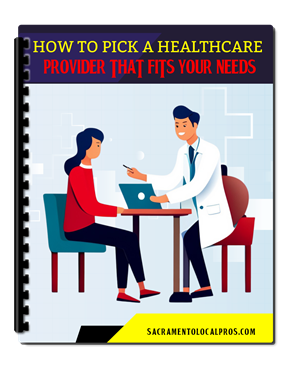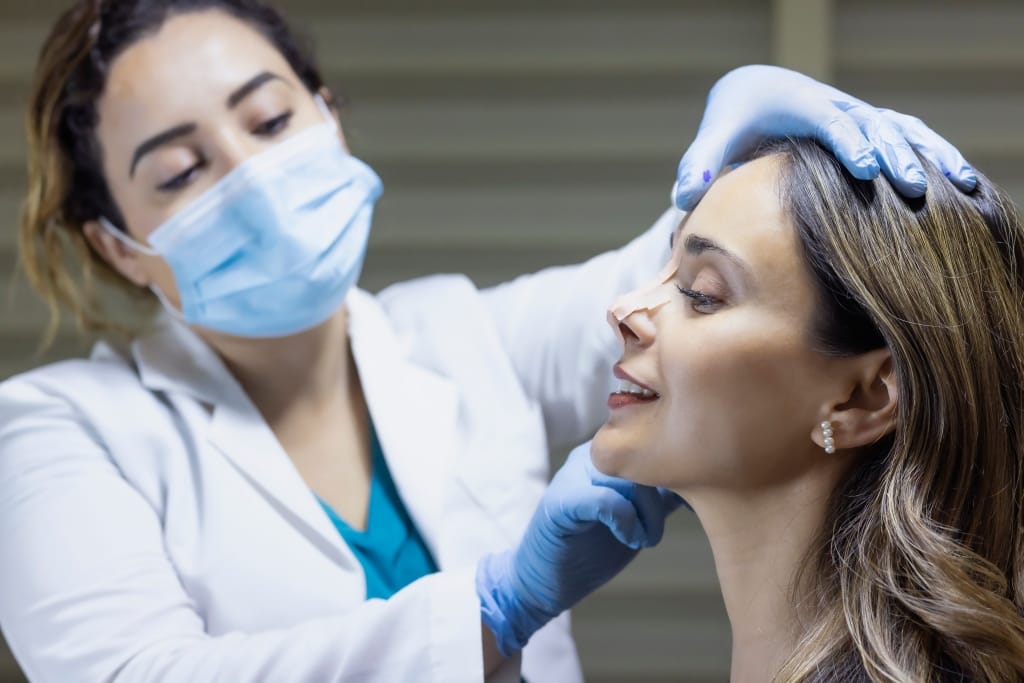Deciding to undergo rhinoplasty can be transformative, influencing both your appearance and self-esteem.
Selecting the right surgeon is imperative for achieving the desired results and ensuring a safe procedure.
With an abundance of options available, navigating the search for a qualified rhinoplasty surgeon can feel challenging.
To streamline your journey, we’ve gathered ten vital tips designed to assist you in finding the ideal professional tailored to your specific needs and expectations.
1)) Research Their Credentials
Before committing to a surgeon, make sure they are board-certified in plastic surgery and have specific experience in performing rhinoplasty procedures.
Check their credentials and verify their qualifications to ensure they are skilled and knowledgeable in this specialized field.
Tips for Researching a Rhinoplasty Surgeon’s Credentials:
- Verify Board Certification: Ensure the surgeon is certified by the American Board of Plastic Surgery, indicating that they have completed the necessary training and examinations.
- Review Their Experience: Look for a surgeon who has extensive experience specifically in rhinoplasty procedures, ideally having performed hundreds of surgeries.
- Check Online Reviews and Testimonials: Read patient feedback on platforms such as RealSelf or Healthgrades to gauge the surgeon's reputation and success rate.
- Evaluate Before and After Photos: Request to see a portfolio of before and after images from previous rhinoplasty patients to assess the surgeon’s aesthetic style and outcomes.
- Confirm Hospital Privileges: Ensure the surgeon has privileges at accredited hospitals, which is essential for the safety and quality of care during the procedure.
Taking the time to thoroughly research a rhinoplasty surgeon's credentials is crucial for your overall satisfaction and safety.
By following these tips, you can make an informed decision, ensuring that your chosen professional possesses the necessary qualifications and experience.
Your goal should be to select a surgeon who not only meets your needs but also instills confidence and peace of mind as you embark on your transformative journey.
2)) Look At Before And After Photos
A reputable surgeon should have a portfolio of before and after photos showcasing their work.
Take the time to review these images to get an idea of the surgeon's aesthetic style and see if their results align with your goals for surgery.
Tips for Evaluating Before and After Photos:
- Look for Consistency: Examine multiple case results to identify if the surgeon consistently achieves similar results across various patients, indicating a reliable skill level.
- Assess Similar Cases: Focus on before and after photos of patients with facial structures and conditions similar to yours, as this can give you a clearer expectation of your potential outcomes.
- Check Photo Quality: Ensure the images are of high quality, with good lighting and angles, allowing you to see the details of the results more clearly.
- Consider Different Angles: Look for photos that show the results from various angles (front, side, and three-quarter views) to get a comprehensive view of the surgical outcomes.
- Be Wary of Excessive Editing: Take note of any signs of photo editing or filtering, as overly retouched images may not accurately represent the surgeon's work and could be misleading.
Thoroughly examining before and after photos is essential in determining the suitability of a rhinoplasty surgeon.
These images provide valuable insights into the surgeon's skill, aesthetic approach, and the realistic outcomes you can expect.
By focusing on consistent results and evaluating cases similar to your own, you can build confidence in your choice of surgeon, ensuring your journey toward your ideal appearance is grounded in informed decisions and high expectations.
3)) Read Patient Reviews
Hearing from previous patients can provide valuable insight into the surgeon's bedside manner, skill level, and overall patient satisfaction.
Look for reviews on reputable websites or ask the surgeon for references from past clients.
- Choose Reputable Sources: Look for reviews on trusted platforms such as RealSelf, Healthgrades, or Google, as these sites often feature verified patient feedback.
- Focus on Recency: Pay attention to recent reviews to gauge the surgeon's current performance, as skills and practices may evolve.
- Look for Detailed Feedback: Consider reviews that provide specific details about the patient's experience, as these accounts can offer deeper insight into the surgeon's approach and results.
- Observe Trends in Feedback: Identify common themes in reviews, such as satisfaction with results, communication, and post-operative care, to better understand the surgeon’s qualities.
- Beware of Extremes: Take note of reviews that are exceptionally positive or negative, as they may reflect biased perspectives. Instead, look for balanced reviews that assess both strengths and weaknesses.
Reading patient reviews is a critical step in selecting a rhinoplasty surgeon.
These testimonials not only reflect the surgeon's skill and results but also shed light on their approach to patient care and communication.
By prioritizing platforms with verified feedback and focusing on detailed, recent reviews, you gain valuable perspectives that can influence your decision.
Understanding past patients' experiences will empower you to make a well-informed choice, setting the stage for a successful surgery and a positive overall journey.
4)) Schedule A Consultation
Meeting with potential surgeons in person is essential to gauge their professionalism, communication style, and how comfortable you feel with them.
Use this opportunity to ask questions about the procedure, discuss your goals, and assess whether you trust them to perform your surgery.
Tips for Scheduling a Consultation:
- Prepare Your Questions: Before the consultation, make a list of specific questions you want to ask the surgeon about their experience, techniques, and potential outcomes to ensure you get all the information you need.
- Evaluate Office Environment: Pay attention to the cleanliness and organization of the clinic, as it can reflect the professionalism of the practice and its commitment to patient care.
- Assess Communication Style: Notice how well the surgeon listens to your concerns and how effectively they communicate their answers, as a good rapport is crucial to building trust.
- Discuss Anesthesia Options: Inquire about the types of anesthesia used during the procedure, as well as the surgeon's experience with administering them to prepare yourself for the surgical day.
- Clarify Follow-Up Care: Ask about the surgeon's post-operative care plan and how they handle complications or concerns after the procedure to ensure you’re comfortable with their level of support.
Scheduling a consultation is a pivotal step in selecting the right rhinoplasty surgeon for your needs.
This face-to-face interaction allows you to assess the surgeon's professionalism, communication style, and compatibility with your expectations.
By preparing thoughtful questions and evaluating both the office environment and the surgeon's approach to your concerns, you can gather the insights necessary to make an informed decision.
Taking the time for this consultation fosters a sense of confidence and trust, laying the groundwork for a successful surgical experience.
5)) Discuss Surgical Techniques
There are different approaches to rhinoplasty surgery, so it's important to discuss which technique the surgeon plans to use for your procedure.
Make sure you understand the potential risks, benefits, and expected outcomes associated with each approach before making a decision.
Tips for Discussing Surgical Techniques:
- Understand Different Techniques: Familiarize yourself with the various surgical approaches to rhinoplasty, such as open vs. closed techniques, so you can engage in informed discussions with your surgeon.
- Ask About Their Preferred Method: Inquire about the surgeon’s preferred technique and the reasons behind it, as this can give you insight into their experience and expertise.
- Discuss Risks and Benefits: Ensure you cover the potential risks and benefits of each technique, allowing you to weigh which option aligns best with your goals and comfort level.
- Request Visual Aids: Ask the surgeon if they can provide diagrams, models, or before-and-after photos relevant to each technique to help you visualize the differences and expected results.
- Clarify Recovery Expectations: Understand how the chosen technique may affect your recovery time and any specific post-operative care needed, which can help you prepare adequately for the healing process.
Discussing surgical techniques is a crucial component of your rhinoplasty journey.
Engaging with your surgeon about the various approaches provides clarity on what to expect during the procedure and the recovery process.
By asking detailed questions about their preferred methods and understanding the associated risks and benefits, you can ensure that your decision aligns with your personal goals.
Gaining insights through visual aids and clear communication fosters a stronger partnership with your surgeon, enhancing your confidence in the surgical plan and outcome.
6)) Inquire About Revision Policies
While rare, revision surgeries may be necessary in some cases to achieve optimal results or address any complications that arise.
Ask about the surgeon's policy on revisions, including any associated costs or timelines for scheduling follow-up procedures.
Tips for Inquiring About Revision Policies:
- Understand the Revision Process: Ask the surgeon to explain the circumstances that may necessitate a revision procedure to ensure you're aware of potential scenarios.
- Clarify Costs: Inquire about any costs associated with revision surgeries, including whether the initial surgeon will cover any expenses or if you will be responsible for them.
- Discuss Timeframes: Find out how long it typically takes to schedule a revision surgery and the recovery times, so you can plan accordingly if a follow-up procedure is needed.
- Confirm Experience with Revisions: Ask about the surgeon's experience performing revision rhinoplasties and their success rates, as this can provide insight into their capability in managing complications.
- Review Policies on Future Consultations: Check whether you are entitled to free follow-up consultations in case you need to discuss concerns or revisions post-surgery, which can help you feel supported throughout your recovery.
Inquiring about revision policies is essential for ensuring your peace of mind during the rhinoplasty process.
Understanding the circumstances that may lead to a revision and being informed about the associated costs and timeframes allows you to make well-rounded decisions.
By discussing the surgeon's experience with revision surgeries and their approach to post-operative consultations, you can feel more secure and supported throughout your journey.
This proactive communication helps establish a strong foundation for the surgical relationship and emphasizes the importance of patient care and satisfaction.
7)) Consider Their Facility
The safety and quality of care provided during surgery are crucial factors in choosing a rhinoplasty surgeon.
Ensure that the surgeon operates in an accredited facility with experienced medical staff who prioritize patient safety and comfort throughout the entire surgical process.
Tips for Considering Their Facility:
- Check Accreditation: Ensure the surgical facility is accredited by a recognized health authority, indicating it meets high standards for safety and quality care.
- Research Facility Experience: Investigate the facility's experience with rhinoplasty surgeries and the overall number of procedures performed to gauge its specialization.
- Inspect Patient Reviews: Look for patient testimonials and reviews regarding their experiences at the facility, focusing on safety, comfort, and post-operative care.
- Evaluate Staff Qualifications: Inquire about the qualifications and experience of the medical staff who will assist in your surgery, as skilled professionals are crucial for ensuring a smooth procedure.
- Visit the Facility: If possible, schedule a visit to the facility to assess its cleanliness, organization, and overall atmosphere, which can provide you with a sense of comfort regarding your surgical environment.
Considering the facility where your rhinoplasty will take place is vital for ensuring a safe and successful outcome.
By evaluating the accreditation status, experience level with specific procedures, and the quality of patient care based on reviews, you can make an informed choice.
Understanding the qualifications of the medical staff and visiting the facility can enhance your comfort and confidence in the surgical process.
Prioritizing these factors not only helps safeguard your health but also contributes to an overall positive surgical experience.
8)) Trust Your Instincts
It's essential to choose a surgeon who listens to your concerns, respects your goals, and makes you feel confident in their abilities.
Trusting your instincts is key when selecting a healthcare provider who will play such an important role in transforming your appearance.
Tips for Trusting Your Instincts:
- Listen to Your Gut: Pay attention to your overall feelings about the surgeon and their practice; if something feels off, it’s worth exploring those feelings further.
- Assess Communication Style: Evaluate how well the surgeon listens to your concerns and addresses your questions; effective communication is key to building trust.
- Reflect on Your Comfort Level: Consider whether you feel at ease discussing your goals and expectations with the surgeon; comfort can indicate a strong rapport.
- Seek Personal Recommendations: Talk to friends or family who have undergone similar procedures and find out about their experiences, as personal insights can guide your decision.
- Trust the Process: Recognize that building trust may take time; ensure you feel confident and respected throughout the consultation and decision-making phases.
Trusting your instincts is a fundamental aspect of selecting the right surgeon for your rhinoplasty journey.
When you feel confident in your surgeon's abilities and comfortable communicating your concerns and expectations, it fosters a more collaborative and effective relationship.
Personal recommendations and introspection can further solidify your decision, ensuring that you choose a healthcare provider who aligns with your goals.
Prioritizing your intuition not only enhances your comfort throughout the process but also plays a significant role in achieving a satisfying outcome.
9)) Evaluate Cost Considerations
While cost should not be the primary factor in choosing a surgeon, it is still important to consider financial implications when planning for rhinoplasty surgery.
Discuss all fees associated with the procedure upfront and inquire about financing options or payment plans if needed.
Tips for Evaluating Cost Considerations:
- Request a Detailed Breakdown: Ask for a comprehensive list of all costs involved in the procedure, including surgeon fees, facility fees, anesthesia, and any potential follow-up visits.
- Inquire About Financing Options: Explore whether the surgeon or facility offers financing plans or payment options that can make the overall cost more manageable.
- Compare Prices: Research and compare costs from multiple surgeons to understand the average pricing in your area; however, be cautious of prices that seem too low, as they may indicate lower quality care.
- Check for Hidden Fees: Clarify whether any additional fees may arise before, during, or after the procedure to avoid unexpected expenses.
- Consider Insurance Coverage: Investigate whether your insurance will cover any part of the surgery, especially if it is deemed medically necessary, as this can significantly impact your out-of-pocket expenses.
Evaluating cost considerations is an essential step in the rhinoplasty decision-making process.
By thoroughly discussing all potential fees and exploring financing options, you can better manage your budget and avoid unexpected expenses.
Comparing costs and understanding insurance coverage will further empower you to make informed financial decisions.
By prioritizing transparency and thoroughness in assessing costs, you can ensure that your approach to financing supports not only your procedure but also your overall peace of mind.
10)) Follow Post-Operative Care Instructions
Once you've chosen a rhinoplasty surgeon and undergone surgery, it's crucial to follow all post-operative care instructions provided by your healthcare team carefully.
This will help optimize healing, minimize complications, and achieve the best possible results from your procedure.
Tips for Following Post-Operative Care Instructions:
- Stay Hydrated: Drink plenty of fluids to support your body's healing process and help reduce swelling.
- Rest and Limit Activity: Take time off to rest and avoid strenuous activities for at least a few weeks to allow your body to heal properly.
- Monitor for Complications: Keep an eye out for any unusual symptoms, such as excessive bleeding or increased pain, and contact your surgeon immediately if you notice anything concerning.
- Follow Medication Guidelines: Take prescribed medications as directed, including pain relievers and antibiotics, to manage discomfort and prevent infection.
- Attend Follow-Up Appointments: Make sure to go to all scheduled follow-up visits to ensure proper healing and address any concerns with your surgeon.
Following post-operative care instructions is crucial for ensuring a smooth recovery after rhinoplasty.
By prioritizing hydration, rest, and monitoring for any unusual symptoms, you can significantly enhance your healing process.
Adhering to medication guidelines and attending all follow-up appointments allows for any complications to be promptly addressed, contributing to optimal results.
By committing to these care practices, you set the foundation for a successful recovery journey.
Conclusion
Selecting the right rhinoplasty surgeon is a crucial step toward achieving not only your cosmetic goals but also a safe and positive surgical experience.
By thoroughly researching credentials, examining past work, consulting patient reviews, and engaging in open conversations with potential surgeons, you can make a well-informed decision.
Remember to trust your instincts throughout the process, as comfort and confidence in your surgeon are paramount.
This careful approach will not only enhance the likelihood of satisfactory results but also ensure that your journey toward transformation is handled with the utmost care and professionalism.
By adhering to the ten essential tips outlined in this guide, you can take significant strides toward locating a skilled surgeon who aligns with your vision and prioritizes your safety and satisfaction at every stage.
Related Articles and Guides:
- How To Choose A Rhinoplasty Surgeon
- How To Negotiate The Best Price For Rhinoplasty Surgery
- 10 Tips To Help You Determine Whether To Fire And Replace A Rhinoplasty Surgeon
Download Our Free E-book!








